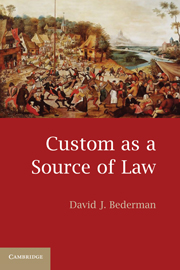4 - Economics, Sociobiology, and Psychology
The Human Impulse of Custom
Published online by Cambridge University Press: 05 June 2012
Summary
Ethnography, cultural studies, and legal history have shaped our understandings of custom. To complete the picture, one also needs to look at the intersection of economics, sociobiology, and psychology. This literature is fairly recent (arising over the last century), combining elements of evolutionary psychology, moral conventionalism, and the study of social norms. Many of these writers see custom as counterpoised with law, as almost an alternative paradigm for resolving disputes. Others see custom as evil, particularly targeting vulnerable populations as victims of outmoded usages, and argue that there must be doctrinal safeguards to prevent particularistic customary norms in preempting generally adopted social values. Yet other scholars question whether custom is inimical to modern legal cultures characterized by a large, diffuse, mobile, technologically sophisticated, and diverse society. The ultimate question raised by these disciplines is whether custom is reflected in basic human nature (self-interest or reciprocal altruism) or is it also an impulse based upon efficiency and rationality?
Custom as Functional
As was recounted in Chapter 1, legal ethnographers such as Bronislaw Malinowski tended to emphasize the fact that customary norms enabled reciprocal relations between sometimes disparate groups within a society. Custom was thus seen as a structural and functional component of social relations, and customary norms were primarily intended to promote a social group’s survival and prosperity. Crude forms of this theory can be traced back in intellectual history to the work of Social Darwinists, such as Walter Bagheot and William Sumner, of the late nineteenth and early twentieth centuries.
- Type
- Chapter
- Information
- Custom as a Source of Law , pp. 42 - 54Publisher: Cambridge University PressPrint publication year: 2010



